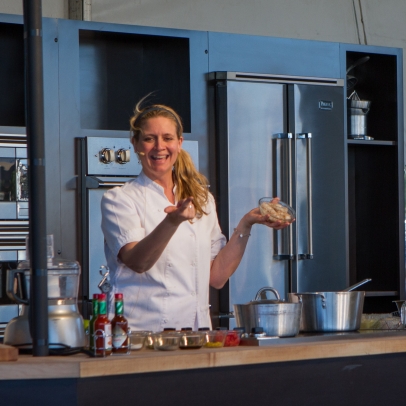What Does Amanda Freitag Eat When She Visits Arizona?
Edible Phoenix had a chance to chat with the delightful Amanda Freitag while she was in town headlining the Chef’s Stage at the Chipotle Cultivate Festival, held at West World on April 18th.
EP: How did you get involved with the Cultivate Festival?
AF: I’ve been involved with Cultivate for 3 years. Nate Appleman, Chipotle’s top chef, is a good friend and this is such a great event. I do a lot of food events and this is truly one of my favorites. It brings together two of my favorite things, food and music and it gets people together thinking about ideas, about how to do it better. All chefs want people to know where their food comes from and this festival is a great way to reach a lot of people around the country.
EP: You have worked with some incredible chefs and cuisines through your career. How do you describe your approach in the kitchen? Is there one influence that predominates and inspires you?
AF: My experience at Verbena with Diane Forley gave me a real taste for the Mediterranean with a mix of French. Later, I cooked Italian for a long time and learned that this seasonal eating ethos has been around forever.
All those things that grow in southern Italy – the eggplant, the tomatoes, basil – you see them in all the regional dishes In northern Italy, different things are growing and the cuisine features more more dairy, richer sauces. It’s a very different style of cooking. It was so interesting to explore regions of Italy and France in that way.
Back in cooking school, I was enamored by European cuisines. In the last several years, I’ve really explored U.S. The quality of dining, food and awareness here has grown and it’s so interesting to see what chefs are using from their regions.
Barbecue is one example, from barbecue sauces to smokers, there’s a specific passion about barbecue. Those pit masters are culinary masters – even creating their own equipment. It’s fascinating to me.
EP: You have a strong connection throughout your career with the local and seasonal ethos. I wonder if you could talk about how you’ve seen this concept evolve over the years?
AF: I think I saw the inception of this movement. When I was starting out, the Union Square Greenmarket was budding and chefs were connecting with farmers and that was really a new concept at the time.
Then it was novel, that local connection of putting farmers name on the menu. Now you can’t even label your restaurant that way because people expect it. Next we saw nose to tail and eating all parts of the animal. Then it went even deeper, considering what are the animals eating, their origin and how they are raised, the distance food travels from farm to plate. All of these things have so much trickle down to the traceability of ingredients, exact sourcing and knowing about that.
People know so much more about food than ever before. They’re asking questions, reading nutritional labels, understanding the difference between organic and conventional.
EP: The northeast had a cold, snowy winter. Now that we’re turning the corner to spring, is there a dish or two you are most looking forward to preparing?
AF: For me, I can’t wait for things like asparagus and peas, mint and favas, ramps. I want every plate to be green. I’ll have a green phase for the next few weeks. In the summer, the plate will be red with tomatoes but, now, it’s green.
EP: Phoenix has a pretty awesome restaurant scene. Is there a place your planning to dine while you’re in town? Or any favorite Southwestern dishes or flavors you crave?
AF: My brother lives in Tucson and when I visit him, one of my favorite things to eat is the Sonoran Hot Dog. I also have to have some very good Mexican. I’m definitely looking for different kinds of hot sauce and chiles. I’m always on the lookout for what’s regional.
EP: I see you’re making a ceviche for the festival. I wonder if you could talk about what inspired the dish.
AF: For this festival, I lightened up recipe. The cuisine out here can be very heavy so I wanted to make something that is bright, fresh and clean. I think with ceviche, people are always curious about how to do it. Does citrus really cook it? I wanted to answer that question.
In this recipe, I poach the shellfish first, escabeche style, and then marinate it in citrus, shallots, Tabasco and olive oil. When you poach the seafood and put it right into the marinade, the proteins are wide open and thirsty. The shellfish really soak up the flavor. It’s a cool technique.
The recipe is from my new cookbook The Chef Next Door that comes out in the fall but you can get a sneak peek of the recipe here.
Chipotle Cultivate, a traveling food, music and ideas festival—which moves to Kansas City and Minneapolis later this summer—was created to share the “Foods with Integrity” ethos that guides the Denver-based fast casual restaurant empire. The free festival aims to educate and elevate conversations around food production, through food-focused exhibits, activities, tasty bites and music.
A tricked out chef’s demo stage featured local talent Charleen Badman (FnB), Joshua Hebert (POSH) and Chris Schlattman (The Upton) sharing the stage with “Top Chef” Richard Blais of Juniper & Ivy in San Diego and Amanda Freitag of Empire Diner in New York, and a “Chopped” judge.




